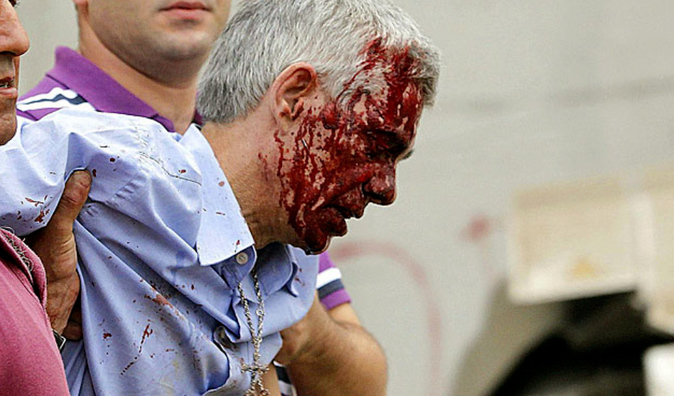Statement The former Adif charge charged by the Alvia blames the driver: "If he had braked four seconds earlier, we would not be here"
Start of the trial The tears of the driver of the Alvia before the judge: "I ask the victims to forgive me, it was an accident, I could not help it"
The inspector who was on the Alvia train on the outskirts of
Santiago de Compostela
on July 24, 2013 ,
Antonio Martín Marugán
, twice denied to the National Police that, just before the accident, he had been on the phone with the driver.
That call became known a week later through the analysis of the telephone record of the corporate cell phone of
Francisco José Garzón Amo
, but before that, the two involved had denied it to the police officers who were investigating what had happened.
The inspector, twice.
Based on the data that is now confirmed, and that no one denies, the inspector made a fateful call to the train driver's corporate mobile phone, which he was obliged to answer, to manage a stop many kilometers later, in the town of
Pontedeume
in A Coruña .
The conversation lasted 100 seconds, in which the driver, as he himself acknowledged in his statement at the trial for the accident, became disoriented and did not brake to slow down before entering the most dangerous curve of that section,
A Grandeira
, in which he was supposed to enter at 80, but he was going at 179 and ended up derailing.
In the accident there were 80 dead and 144 injured.
The trial for the accident held
by the Criminal Court number 2
of Santiago in the
City of Culture of Galicia
had its fourth session on Tuesday, the first of witness statements after the interrogations of the two defendants (the driver and the head of traffic safety of Adif when the line came into service,
Andrés Cortabitarte
).
Police officers passed through the hearing room and went to the scene of the derailment on the afternoon and night of the accident, as well as those who carried out the first investigations into what happened.
One of those policemen, assigned to the
Judicial Police
of the Santiago Police Station, confirmed that refusal of the two involved in the call.
He was the secretary of the first police report on the accident delivered to the court and the person in charge of the driver's arrest.
He was arrested the day after the incident, while he was admitted to the hospital, although it was not until he was discharged that he was transferred to the Police Station and then to the court.
As he explained, in the first moments of the investigation they tried to "determine if there was a distraction of the train driver" and, for this, they interviewed him and also the controller and the
Renfe
guard who was also traveling on the train.
Although they were asked about a possible mistake, none of them told them about that call.
In a first interrogation of Antonio Martín Marugán, he only acknowledged a "small call" when the train was stopped in
Ourense
, the station prior to the accident.
A week after the accident, on July 31, the telephone records revealed the existence of that call, so they called the driver to ask him if he remembered that call and he denied it.
For the second time.
According to this policeman, the Renfe guard did not deny the call, but postponed any response to speak with his superiors first.
"Neither the driver nor the inspector gave us information about the call. We discovered it when we investigated," said this police officer.
Once that call was confirmed, and after that first telephone conversation between the police officers and the inspector, all those involved were summoned before the then investigating judge,
Luis Aláez
.
There, the existence of the call was already recognized, the content of which appears in the summary of the case.
"I screwed up," said the driver
The first police officer to arrive at the scene, the first to speak with the train driver, also testified on Tuesday and confirmed in the trial session on Tuesday that already at that time, as soon as he derailed, Francisco José Garzón Amo acknowledged his imprudence.
Now, both he and Andrés Cortabitarte are accused of 80 crimes of homicide due to serious professional negligence, 145 of injuries due to serious professional negligence and a crime of damage.
Both face four years in prison.
When this policeman saw him, he was already out of the cabin and covered in blood and told him "I screwed up, I was going 190".
In any case, according to this testimony, the driver was unaware of the real impact of the tragedy, he thought that he had derailed with injuries, not that there were so many deaths.
Thus, he asked him if there was anyone injured and, when the policeman wanted to reassure him, he asked: "How can I not go, am I not going to be worried?"
Another policeman who took him to the hospital from the tracks also confirmed that the driver "was regretting with remorse" with phrases like "I wish it would happen to me" and said that an accident of this type was foreseeable and that he had already warned that it would happen "some day" because all the security was in the hands of the driver and he had lost the references and thought he was in a previous section of the route.
Conforms to The Trust Project criteria
Know more
Santiago de Compostela
Renfe
Ourense
Train accident in Santiago

